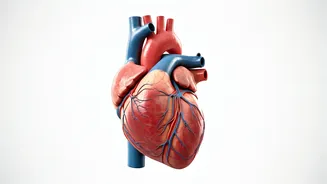Dietary Modifications for Hearts
The cornerstone of a heart-healthy lifestyle is a balanced diet. This involves reducing the intake of saturated and trans fats, which are commonly found
in processed foods, fried items, and certain meats. These fats can elevate LDL cholesterol levels, increasing the risk of plaque buildup in arteries. Instead, focus on incorporating heart-healthy fats, such as those found in avocados, nuts, and olive oil, into your meals. These fats can help lower LDL cholesterol and boost HDL cholesterol, which is beneficial. Additionally, increase your consumption of fruits, vegetables, and whole grains, which are packed with fiber, vitamins, and antioxidants. Fiber helps control cholesterol levels, while antioxidants protect against cell damage. Aim for a variety of colorful produce to ensure you're getting a wide range of nutrients. Consider limiting sodium intake, as high sodium levels can lead to high blood pressure, placing additional strain on the heart. Read food labels carefully and cook meals at home more often to control portion sizes and ingredients, thereby optimizing your heart health through smart dietary choices. Finally, portion control is also essential, so avoid overeating and aim to have regular meal times.
Importance of Physical Activity
Regular physical activity is another critical aspect of a heart-healthy lifestyle. Aim for at least 150 minutes of moderate-intensity exercise or 75 minutes of vigorous-intensity exercise per week. Moderate-intensity exercises include brisk walking, cycling, and swimming, while vigorous activities can include running, high-intensity interval training (HIIT), and playing sports. Exercise helps lower blood pressure, improve cholesterol levels, and strengthen the heart muscle. It also helps in maintaining a healthy weight, which is another crucial factor in heart health. Incorporating physical activity into your daily routine doesn't have to be tedious. You can choose activities you enjoy, such as dancing, hiking, or team sports, to make exercise more enjoyable. Aim for a mix of aerobic exercises to elevate your heart rate, and strength training to build muscle mass, which helps boost your metabolism. Even short bursts of activity throughout the day, such as taking the stairs instead of the elevator or going for a walk during your lunch break, can have significant benefits. Consistency is key, so find activities you can stick with long-term, and gradually increase the intensity and duration as you become fitter. Always consult with a healthcare provider before starting a new exercise program.
Stress Management Techniques
Chronic stress can negatively impact heart health by increasing blood pressure and triggering unhealthy behaviors like overeating and smoking. Effective stress management is therefore essential. Practice relaxation techniques like deep breathing exercises, meditation, or yoga to calm your mind and body. Deep breathing can lower heart rate and blood pressure, promoting a sense of calm. Meditation can reduce stress hormones and improve overall well-being. Yoga combines physical postures, breathing techniques, and meditation, providing a holistic approach to stress management. Regular physical activity, as discussed previously, can also serve as a stress reliever. Exercise releases endorphins, which have mood-boosting effects. Ensure you get enough sleep, as sleep deprivation can exacerbate stress levels. Aim for seven to eight hours of quality sleep each night. Consider setting realistic goals and learning to say no to commitments that overwhelm you. Make time for hobbies and activities you enjoy, as these can provide a sense of joy and fulfillment. If stress becomes overwhelming, consider seeking support from a therapist or counselor. They can provide tools and strategies for managing stress effectively. Moreover, take breaks throughout the day to de-stress. Even a few minutes of quiet time or a brief walk can make a difference.
Regular Health Check-ups
Regular health check-ups and screenings are vital for maintaining heart health. Visit your doctor for routine check-ups, including blood pressure and cholesterol level monitoring. Early detection and intervention are key to preventing and managing cardiovascular diseases. Blood pressure and cholesterol can be measured with simple tests, providing important insights into your heart health. If your blood pressure is high, your doctor may recommend lifestyle changes or medications to bring it down. High cholesterol levels can lead to plaque buildup in arteries, increasing the risk of heart disease. Your doctor can help you understand your risks and develop a personalized plan to improve your heart health. Discuss your family history of heart disease with your doctor, as genetics can play a role. Family history helps determine your risk level and guide preventive measures. Depending on your age and risk factors, your doctor might recommend additional screenings, such as an electrocardiogram (ECG) to assess heart function. Follow the recommendations of your healthcare provider for regular check-ups and screenings. These preventive measures are crucial for protecting your heart and overall health. Maintain open communication with your doctor about any symptoms or concerns. Early detection and appropriate treatment are critical to manage heart conditions effectively. Always remember that a healthy heart requires proactive and consistent care.





















